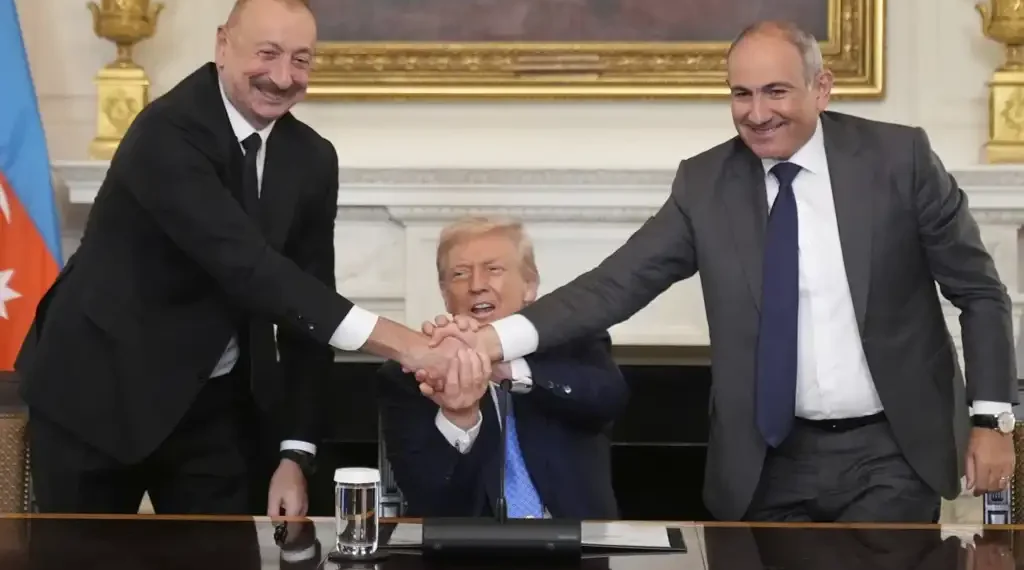Armenia and Azerbaijan Sign Historic U.S.-Brokered Peace Agreement at White House
Published: August 9, 2025 – 15:00 (U.S. Eastern Time)
Deal includes creation of new “Trump Route” to reopen key transit links and boost regional cooperation
Washington, D.C. – In a landmark moment for the South Caucasus, the leaders of Armenia and Azerbaijan shook hands at the White House on Friday before signing a U.S.-brokered peace agreement aimed at ending decades of conflict over the Nagorno-Karabakh region.
U.S. President Donald Trump stood between Azerbaijani President Ilham Aliyev and Armenian Prime Minister Nikol Pashinyan as they extended their hands across the table. The symbolic gesture marked a breakthrough after nearly 35 years of tension, war, and failed negotiations.
A Landmark Agreement After Decades of Conflict
The agreement, signed in the presence of U.S. officials, will reopen key transportation routes between Armenia and Azerbaijan while strengthening American influence in a region where Russia’s role has diminished.
One of the central elements of the deal is the creation of a major transit corridor named the Trump Route for International Peace and Prosperity, connecting Azerbaijan to its autonomous Nakhchivan exclave through Armenian territory. The corridor will also provide a more direct link from Azerbaijan to Turkey and, by extension, to Europe.
President Trump called the naming of the route “a great honor,” noting that it was suggested by Armenian representatives. “Thirty-five years they fought, and now they’re going to be friends for a long time,” Trump said.
Leaders Praise U.S. Mediation
Both Aliyev and Pashinyan credited the U.S. administration for making the deal possible.
“We are laying a foundation to write a better story than the one we had in the past,” said Armenian Prime Minister Pashinyan, calling the agreement a “significant milestone.”
Azerbaijani President Aliyev described the outcome as “a miracle” achieved in six months of diplomacy, praising Trump’s personal role in the negotiations.
Trump has previously expressed his desire to be remembered as a peacemaker and has been mentioned by foreign leaders as a potential Nobel Peace Prize nominee for his role in mediating international disputes.
Strategic and Economic Implications
For Azerbaijan, the Trump Route represents both economic opportunity and strategic connectivity, allowing faster and more efficient trade routes to Turkey and European markets. The corridor is also expected to carry rail lines, oil and gas pipelines, and fiber-optic infrastructure.
According to senior U.S. administration officials, at least nine international developers have already expressed interest in the project, with negotiations set to begin next week.
In addition to the joint Armenia-Azerbaijan deal, both countries signed separate agreements with the United States to expand cooperation in energy, technology, and economic development.
U.S. Influence Rises as Russia’s Role Declines
The deal comes at a time of shifting geopolitical dynamics in the South Caucasus. Russia, historically the primary mediator in the Armenia-Azerbaijan conflict, has seen its influence wane since its full-scale invasion of Ukraine in February 2022.
U.S. officials see the agreement as a strategic opportunity to deepen ties in a region long dominated by Moscow. The peace initiative began earlier this year when Trump’s diplomatic envoy, Steve Witkoff, met with President Aliyev in Baku to discuss what officials described as a “regional reset.”
Decades of Tensions Over Nagorno-Karabakh
The Armenia-Azerbaijan conflict has its roots in the late Soviet period, when both nations fought over the Nagorno-Karabakh region. Populated mainly by ethnic Armenians but internationally recognized as part of Azerbaijan, the area has been a flashpoint for repeated wars and skirmishes.
After years of stalled peace talks, Azerbaijan regained full control of Karabakh in 2023. A major obstacle to further normalization had been Azerbaijan’s demand for a land bridge to Nakhchivan, known as the Zangezur corridor. Armenia resisted this proposal, citing sovereignty concerns.
However, U.S. mediation, combined with the prospect of improved trade access and closer ties with Washington, helped bridge the gap between the two sides.
A Turning Point for the Region
The agreement is seen by analysts as a significant step toward long-term stability in the South Caucasus. For Armenia, it offers an opportunity to diversify foreign relations and reduce reliance on Russia. For Azerbaijan, it strengthens its position as a regional energy hub.
Trump expressed confidence that the peace will hold, telling reporters, “I’m very confident this will last, and I look forward to visiting the Trump Route in the future.”
While the deal is a major diplomatic success, experts caution that implementing its provisions will require continued cooperation, trust-building, and international oversight.
This article was rewritten by JournosNews.com based on verified reporting from trusted sources. The content has been independently reviewed, fact-checked, and edited for accuracy, neutrality, tone, and global readability in accordance with Google News and AdSense standards.
All opinions, quotes, or statements from contributors, experts, or sourced organizations do not necessarily reflect the views of JournosNews.com. JournosNews.com maintains full editorial independence from any external funders, sponsors, or organizations.
Stay informed with JournosNews.com — your trusted source for verified global reporting and in-depth analysis. Follow us on Google News, BlueSky, and X for real-time updates.














